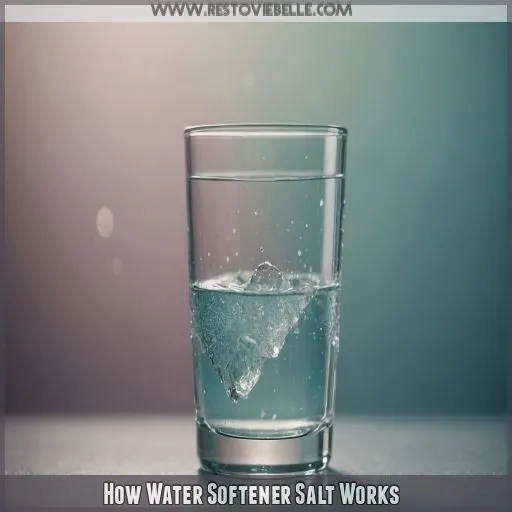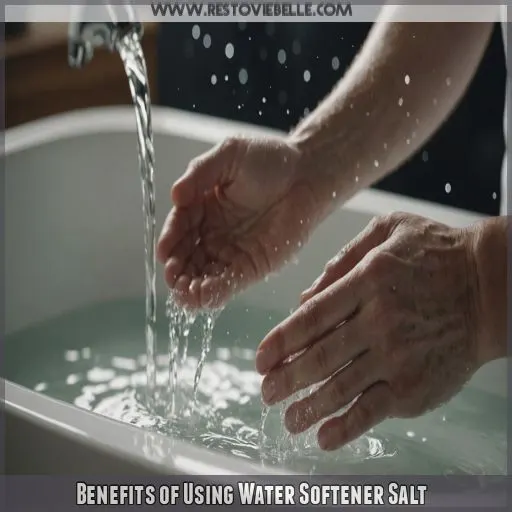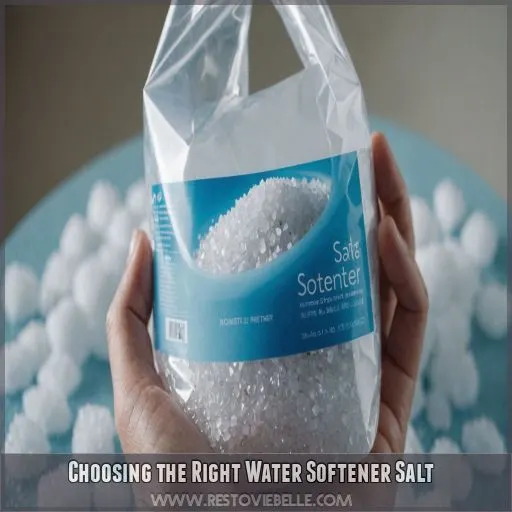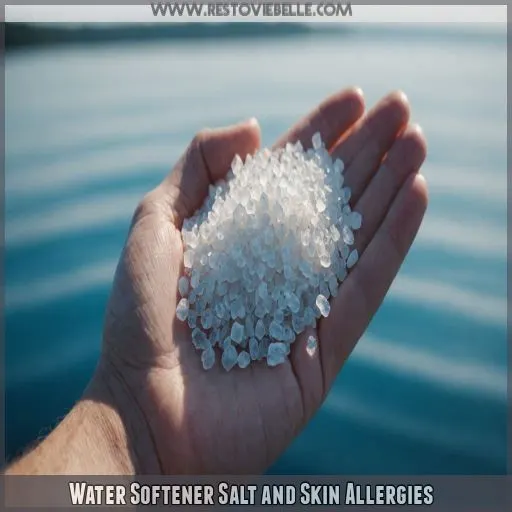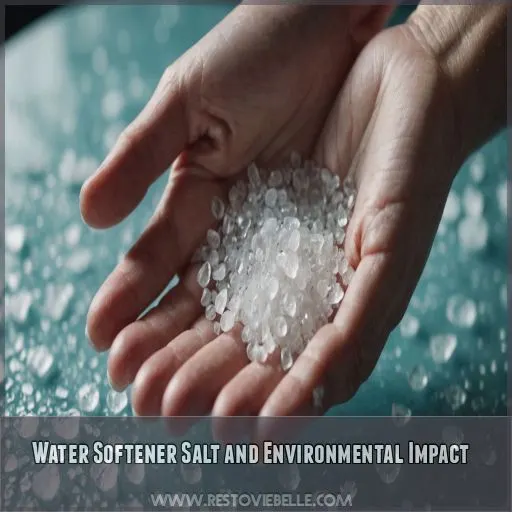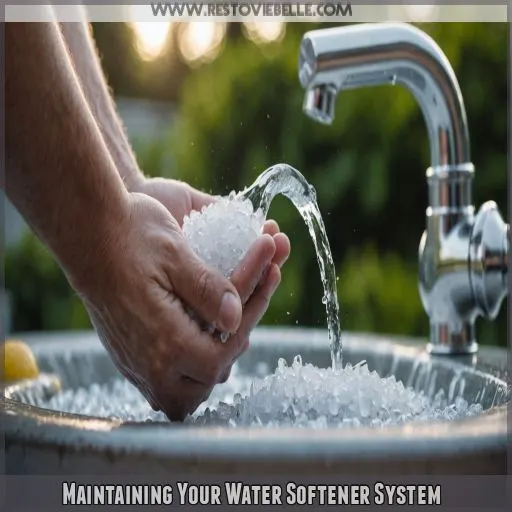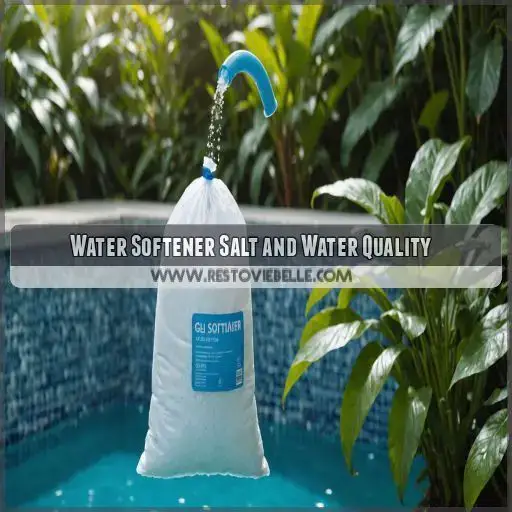This site is supported by our readers. We may earn a commission, at no cost to you, if you purchase through links.
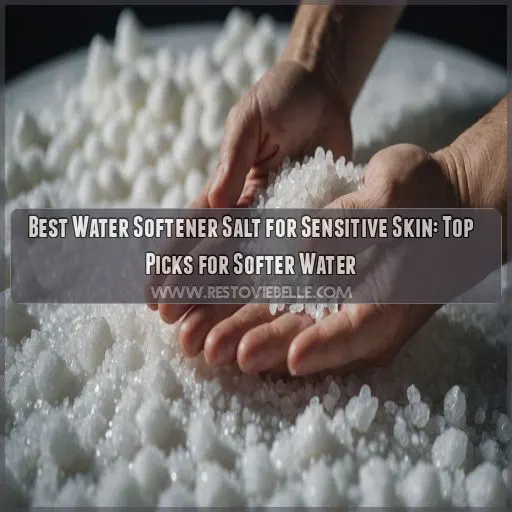
The right Water Softener salt can help.
For sensitive skin, choose pure, natural salts without added minerals.
Morton’s Clean and Protect II Water Softening Pellets are a great option, reducing skin and hair dryness while minimizing scale buildup.
Morton Potassium Chloride Pellets are another top choice, being salt-free and gentle on skin.
These pellets are also a good option for those on low-sodium diets.
For a natural salt crystal option, try Diamond Crystal Solar Salt Crystals.
Table Of Contents
- Key Takeaways
- How Water Softener Salt Works
- Benefits of Using Water Softener Salt
- Choosing the Right Water Softener Salt
- Top 1 Water Softener Salts for Sensitive Skin
- Water Softener Salt and Skin Allergies
- Water Softener Salt and Environmental Impact
- Maintaining Your Water Softener System
- Water Softener Salt and Water Quality
- Frequently Asked Questions (FAQs)
- Can I be allergic to water softener salt?
- What is the cleanest salt for a water softener?
- Is water softener good for sensitive skin?
- What type of water is best for sensitive skin?
- What water softener salt is safest for sensitive skin?
- How often do water softener salts need replacing?
- Does water softener salt type impact skin allergies?
- Whats the eco-friendliest water softener salt option?
- How does water quality impact softener salt choice?
- Conclusion
Key Takeaways
- You’re not alone in the struggle with sensitive skin – hard water can be a major culprit, but choosing the right water softener salt can be a game-changer. Look for naturally dried salts without additives or chemicals, such as Diamond Crystal Solar Naturals or Morton Potassium Chloride, to reduce irritation and keep your skin happy.
- Don’t let water softener salt confuse you – the type you choose can impact your skin allergies. If you have sensitive skin, opt for potassium chloride salts, which are a more environmentally friendly alternative to traditional sodium chloride salts and produce less chloride discharge.
- You’re probably wondering how often to replace your water softener salts – the answer is typically every 20-30 days, depending on your water usage and softener tank size. Check your owner’s manual for specific guidelines, and don’t forget to refill regularly for optimal performance.
- Finding the best water softener salt for sensitive skin can be challenging, but we’ve got you covered. Top picks include Morton’s Clean and Protect II and Morton Potassium Chloride Pellets, which are designed to tackle hard water and soften it, making it gentler on your skin.
How Water Softener Salt Works
You’re probably wondering how water softener salt works its magic to give you softer, gentler water that’s a breeze on your sensitive skin.
Water softener salt actually uses a simple ion exchange process to remove hard minerals like calcium and magnesium from your water and replace them with sodium ions.
This makes your water a game-changer for your skin and household appliances.
Ion Exchange Process
The ion exchange process is how water softeners work.
Water softener salt swaps hard minerals like calcium and magnesium for sodium ions.
This clever exchange happens within the water softener‘s resin tank.
This makes your water softer and gentler on your skin.
Think of it like a game of musical chairs, but with ions – sodium takes the place of the unwanted minerals!
Removing Hard Minerals
Now that you know how the ion exchange process works, let’s talk about removing those pesky hard minerals.
Hard water contains high levels of calcium and magnesium, which can cause skin irritation, dry skin, and other issues.
Water softener salt removes these minerals, making your water softer and gentler on your skin.
This is especially important for people with sensitive skin or skin allergies.
Replacing With Sodium Ions
Now that you know how hard minerals are removed, let’s talk about the replacement process.
Sodium ions take their place, making your water soft and gentle on your skin.
This ion exchange process happens within the resin beads of your water softening system.
Sodium chloride, or salt, is the most common agent used, but potassium is a great alternative for those with sodium sensitivities.
Benefits of Using Water Softener Salt
You’re probably no stranger to the frustrations of hard water, from itchy skin to stained appliances. Using a water softener salt can be a game-changer, providing you with softer water that’s gentler on your skin and reduces appliance buildup, making your daily life a little easier.
Softer Water for Sensitive Skin
Now that you know how water softener salt works, let’s talk about its benefits for your sensitive skin. With softer water, you can say goodbye to skin irritation and eczema. Here are just a few ways water softener salt can improve your bath time routine:
- Gentle on skin, reducing irritation and redness
- Soothes eczema and other skin conditions
- Leaves hair feeling soft and silky
Reduces Appliance Buildup
You’re enjoying the benefits of softer water for your sensitive skin, but what about your appliances? Hard water can causeUsing water buildup soft, reducing theirener efficiency salt and reduces lifespan. appliance Using buildup a water, soft savingener salt you can from help prevent pes ckylogged pipes hard and pes waterky spots hard water and spots c.
pipesAppliance. Hard Water Cleaning Effects products work more efficiently, andWater Soft yourener appliances stay in Benefits top
shape
a
cleaning
spots,
taste
-90By%
right water
Extends Appliance Lifespan
You want to get the most out of your appliances, right? Using water softener salt can help extend their lifespan. Here are three ways it works:
- Prevents Scale Buildup: Soft water reduces mineral deposits that can clog and damage appliances.
- Cuts Soap Scum Buildup: Soft water makes cleaning easier, reducing soap scum residue that can harm appliances.
- Reduces Maintenance Costs: With softer water, appliances require less maintenance, saving you time and money.
Reduces Hair Fall
Using a water softener salt can be a game-changer for your hair. Hard water can strip your hair of its natural oils, leading to dryness, dandruff, and (you guessed it) hair fall. By switching to a gentle water softener salt like Morton Salt or Diamond Crystal Salt, you can help maintain a healthy scalp and reduce hair fall.
Prevents Rust Stains
You’re tackling hair fall, now let’s talk about those pesky rust stains. Water softener salt helps prevent them, saving your appliances and clothes from unsightly marks. By removing iron and other minerals, softener salts like Morton F124700000g protect your belongings from corrosion. Say goodbye to tedious rust stain removal and hello to a stress-free laundry day.
Choosing the Right Water Softener Salt
Choosing the right water softener salt can be tricky, especially with so many options out there.
You want something that’s gentle on your skin but still does a good job of getting rid of those hard minerals in your water.
So, what should you look for?
Think about your skin type, the type of salt, and any special features that might be important to you, like how eco-friendly it is or if it helps fight iron buildup.
Sensitive Skin Considerations
If you have sensitive skin, choosing the right water softener salt is really important to avoid skin irritation and eczema triggers. Here’s what to keep in mind:
- Natural and Pure: Opt for naturally dried salts without additives or chemicals. The purer, the better for sensitive skin.
- Hypoallergenic: Some salts are hypoallergenic, so go for those that won’t trigger allergies or irritate your skin.
- No Fragrances: Avoid salts with added fragrances, as these can be irritating to sensitive skin.
- Gentle on Skin: Look for salts that advertise themselves as gentle or ideal for sensitive skin.
Sodium or Potassium Options
Most water softener salts use sodium chloride (NaCl) to soften water.
If you’re watching your sodium intake or have sensitive skin, potassium chloride is a great alternative.
It’s just as effective at making water soft and it’s better for your health if you have sodium allergies.
The downside? Potassium-based systems can cost more.
Pellets or Crystals
Now that you’ve decided on sodium or potassium, let’s talk pellets or crystals. Crystals dissolve faster, reducing brine tank buildup, but may increase salt consumption. Pellets, on the other hand, are more processed and denser, affecting dissolving speed. For sensitive skin, consider crystal size and pellet density to help make sure your water is clean and to help minimize irritation.
Price and Usage
When choosing a water softener salt, think about the price and how much you use it to make sure you’re getting the best value. Here are key things to keep in mind:
- Salt cost: Figure out the cost per bag and how long it lasts.
- Salt lifespan: Check the product’s NSF certification for guaranteed performance.
- Usage factors: Think about your household’s water consumption and the softener’s capacity.
- Budget impact: See how much salt you’ll use and how that will affect your budget.
Special Qualities
When choosing a water softener salt, consider its special qualities. Some salts offer iron removal, rust prevention, or odor reduction. Others focus on mineral balance or crystal size. Think about your specific needs and priorities. Check out the table below for a summary of some popular options.
| Special Quality | Description |
|---|---|
| Iron Removal | Reduces iron content in water |
| Rust Prevention | Prevents rust stains on appliances |
| Odor Reduction | Eliminates unpleasant odors |
| Mineral Balance | Maintains healthy mineral levels |
Top 1 Water Softener Salts for Sensitive Skin
You’re on the hunt for the best water softener salt for your sensitive skin, and you want to know which one tops the list. Let’s take a closer look at the top pick, Cargill 7304 Water Softening Salt, and see why it’s a great option for those who need a gentle yet effective solution for softer water.
1. Cargill 7304 Water Softening Salt
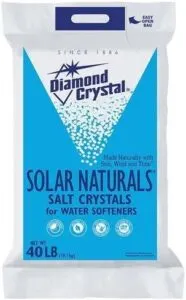
You’re looking for a reliable water softener salt that’s gentle on your sensitive skin. Cargill 7304 Water Softening Salt is a top pick, and for good reason. This coarse-screened, white crystalline sodium chloride is cleaner and more efficient than rock salt, ensuring your water softener system runs smoothly. With its polybagged packaging, you can trust it’ll stay dry and effective. Plus, its 4.5-star rating and fast shipping make it a convenient choice for softer, healthier water.
Best For: This water softener salt is perfect for those with sensitive skin or anyone looking for a high-quality, efficient option.
- Cleaner and more efficient than rock salt.
- Polybagged packaging for added moisture protection.
- Fast shipping and a 4.5-star rating.
- May be more expensive than similar products available in local stores.
- Some customers reported packaging issues, such as open bags or spills during transportation.
- Available in larger sizes, but not in smaller quantities.
Water Softener Salt and Skin Allergies
If you have sensitive skin, you know the struggle of finding products that won’t irritate it. Water softener salt is no exception, and with the wrong type, you might end up with more rashes and redness.
Can I Be Allergic to Water Softener Salt?
It’s rare to be allergic to water softener salt itself, but it’s not uncommon to have sensitive skin or sodium sensitivity.
If you experience skin reactions, it might be due to the type of salt or additives used.
Sodium chloride is common, but if you’re sensitive to sodium, opt for potassium chloride.
If you have skin issues, look for natural salts without additives.
Your skin will thank you!
Hypoallergenic Water Softener Salt Options
If you have sensitive skin, the right water softener salt is essential to avoid irritation. Here are some hypoallergenic options:
- Go Natural: Choose solar salts, which are naturally dried by sun and wind, like Diamond Crystal Solar Salt.
- Potassium Power: Opt for potassium chloride salts, a sodium-free option. Morton and Diamond Crystal offer good choices.
- Pure Promise: Look for highly pure salts, like Diamond Crystal Bright & Soft, with minimal impurities to reduce skin issues.
- Sensitive Skin Saver: Morton Pure and Natural Salt is a good pick, with no additives and minimal impurities.
How to Choose the Right Salt for Sensitive Skin
When choosing the best water softener salt for sensitive skin, your priority is to avoid irritating additives.
Opt for natural salts, like solar salt, which is dried by sun and wind.
If you have skin allergies, steer clear of sodium chloride and choose potassium chloride instead.
It’s a more skin-friendly option that’s proven effective.
Be sure to check your softener is compatible with this salt type.
Water Softener Salt and Environmental Impact
Choosing an eco-friendly water softener salt is a win for both your skin and the planet. In this section, we’ll explore options with less environmental impact, from salts that reduce chloride discharge to those that are simply kinder to the earth.
Eco-Friendly Water Softener Salt Options
You care about the planet, and so do we! When it comes to water softener salt, you have eco-friendly options. Look for sustainable salt sources, biodegradable bags, and salt recycling programs. Here are three options to look into:
- Diamond Crystal Salt: Harvested from renewable sources, this salt is a great choice for the environmentally conscious.
- Cargill Salt: This company offers a salt recycling program and uses biodegradable bags to reduce waste.
- Morton Potassium Chloride Pellets: With less chloride discharge, these pellets are a more eco-friendly option for water softening.
Reducing Chloride Discharge
You’re probably concerned about the environmental impact of your water softener salt. Reducing chloride discharge is a great step forward. Consider switching to eco-friendly salts or salt alternatives that minimize waste. By choosing a more efficient water softener salt, you’ll help the planet and enjoy softer water and a clearer conscience.
Sustainable Water Softener Salt Choices
Sustainable choices matter, and that includes your water softener salt.
Eco-friendly options reduce the impact on the environment without compromising performance.
Cargill Salt 7304 is a great example, with a smaller eco-footprint and NFS approval.
Morton’s potassium chloride pellets are another eco-pick, with less chloride discharge.
Look for biodegradable options and recycled packaging to further lessen your impact.
Green choices keep our planet happy!
Maintaining Your Water Softener System
You’ve invested in a water softener system to tackle your hard water woes, but to keep it running smoothly, you’ll need to perform some regular maintenance tasks. By staying on top of maintenance, you’ll extend the lifespan of your system, but you’ll also make sure it continues to provide you with soft, gentle water that’s a blessing for sensitive skin.
Regular Maintenance Schedule
To keep your water softener system running smoothly, establish a regular maintenance schedule. Clean the brine tank every 3-6 months to prevent salt buildup. Regenerate your softener as recommended by the manufacturer, usually every 7-10 days. Regular maintenance will help you troubleshoot issues and minimize the impact of water usage on your system’s performance.
Checking Salt Levels
Now that you’ve got a regular maintenance schedule down, it’s time to focus on checking those salt levels! You don’t want to run out of salt and end up with hard water again. Here are 4 things to keep in mind:
- Check your salt level indicator: This is usually a float or a gauge on the side of your brine tank.
- Look for the salt level warning: Some systems have a warning light or alert when the salt level gets too low.
- Check the salt level regularly: Try to check it at least once a month, or more often if you have a large household.
- Replenish salt as needed: Add more salt to the brine tank according to the manufacturer’s instructions.
Cleaning the Brine Tank
Now that you’re checking salt levels regularly, it’s time to tackle the brine tank. Cleaning it every 3-6 months helps prevent salt bridging and keeps your system running smoothly. Use a long-handled brush, water, and a cup of vinegar to remove debris. Here’s a simple cleaning schedule:
| Cleaning Task | Frequency |
|---|---|
| Check salt levels | Every 1-2 months |
| Clean brine tank | Every 3-6 months |
| Inspect tank for damage | Every 6 months |
| Replace worn-out parts | As needed |
Replacing the Water Softener System
Replacing your water softener system can feel like a big job, but it’s important to keep your water soft and your skin healthy. Here are some things to think about:
- System lifespan: Check how long your system is supposed to last and plan to replace it every 10-15 years.
- Cost comparison: Compare the prices of different systems and think about things like maintenance and how much salt you’ll use.
- Installation process: Decide if you’ll do it yourself or hire a pro, thinking about your plumbing skills and warranty needs.
- Warranty check: Make sure you understand the warranty and maintenance requirements for the new system, so you’re covered.
Water Softener Salt and Water Quality
You’re probably aware that hard water can wreak havoc on your skin and appliances.
Did you know that the quality of your water also affects the performance of your water softener salt?
The type of salt you choose can make a big difference in how effectively it removes minerals and impurities from your water, especially if you have iron-rich or extremely hard water.
How Water Quality Affects Water Softener Salt Choice
When choosing a water softener salt, consider your water source.
City water tends to be treated and may have lower mineral content, while well water can vary in hardness and iron content.
If you’re on city water, aim for salts that maintain softness and protect pipes.
For well water, focus on iron removal and softening.
Regularly test your water quality to adjust your salt choice accordingly.
Iron Content and Water Softener Salt
Iron and hard water are a stubborn pair. If your water leaves rusty stains on sinks and tastes like metal, it’s high time to tackle that iron content. Here’s how the right water softener salt can help:
- Iron Removal Go for salts designed for iron removal, like Morton’s Clean & Protect/Rust Defense Pellets. They’re 15 times more powerful than plain salt at removing iron and perfect for well water.
- Taste and Stain Issues These pellets remove the metallic taste from your water and defend against stubborn stains. No more rust-colored sinks or appliances!
- Well Water Woes If you’re dealing with well water, iron-removing salts are a must. They’ll improve water taste and reduce staining issues.
- Water Softener Maintenance Keep your softener running smoothly by regularly checking salt levels and refilling with the right type. This helps make sure you get effective iron removal and stain prevention.
Hard Water and Water Softener Salt Effectiveness
Hard water is a common issue, and it’s important to understand its impact on your water softener’s effectiveness. The harder your water, the more minerals are present, and the more salt your softener will use. This can impact skin irritation and the lifespan of your appliances. Here’s a table illustrating the relationship between water hardness, salt type, and potential effects:
| Water Hardness | Salt Type | Potential Effects |
|---|---|---|
| High | Sodium | Increased sodium content, potential skin irritation |
| High | Potassium | Reduced environmental impact, softer water |
| Moderate | Sodium | Balanced softness, less salt usage |
Frequently Asked Questions (FAQs)
Can I be allergic to water softener salt?
Yes, it’s possible to be allergic to water softener salt, especially if you have sensitive skin. Symptoms like rashes or irritation might flare up. The good news? You’ve got options. Potassium chloride salts are a great sodium-free choice.
What is the cleanest salt for a water softener?
Cutting through the clutter, you’re looking for the cleanest salt for your water softener. Opt for naturally dried salts without additives, like Diamond Crystal Solar Naturals, which is 6% pure sodium chloride and NSF certified.
Is water softener good for sensitive skin?
Yes, a water softener can be a game-changer for sensitive skin. Hard water’s minerals can irritate skin and cause issues like eczema. Softeners swap those minerals for sodium ions, leading to softer water and happier skin.
What type of water is best for sensitive skin?
For sensitive skin, soft water is your best bet. Hard water’s high calcium and magnesium levels can irritate skin, causing rashes and eczema. Using a water softener can help remove these minerals, making water gentler on your skin.
What water softener salt is safest for sensitive skin?
Break out the ol’ abacus, friend! If you have sensitive skin, you’ll want a water softener salt that’s gentle. Opt for naturally dried salts without additives or chemicals, like Diamond Crystal Solar Naturals or Morton Potassium Chloride.
How often do water softener salts need replacing?
You’ll typically need to replace water softener salts every 20-30 days, depending on your water usage and softener tank size. Check your owner’s manual for specific guidelines, and don’t forget to refill regularly for the best performance.
Does water softener salt type impact skin allergies?
You might be surprised, but yes, the type of water softener salt you use can impact skin allergies. If you have sensitive skin, look for naturally dried salts without additives or chemicals to reduce irritation.
Whats the eco-friendliest water softener salt option?
You’re looking for an eco-friendly water softener salt option. Consider potassium chloride salts, which produce less chloride discharge and are a more environmentally friendly alternative to traditional sodium chloride salts.
How does water quality impact softener salt choice?
Water quality matters when picking a softener salt. Hard water with high iron content calls for specialized salt like Morton’s Clean & Protect pellets, which are designed to tackle iron and soften water.
Conclusion
Finding the best water softener salt for sensitive skin is like striking gold.
You’ll say goodbye to dry, itchy skin and hello to a softer water haven.
The right salt can make a big difference for your skin.
Top picks include Morton’s Clean and Protect II and Morton Potassium Chloride Pellets.

